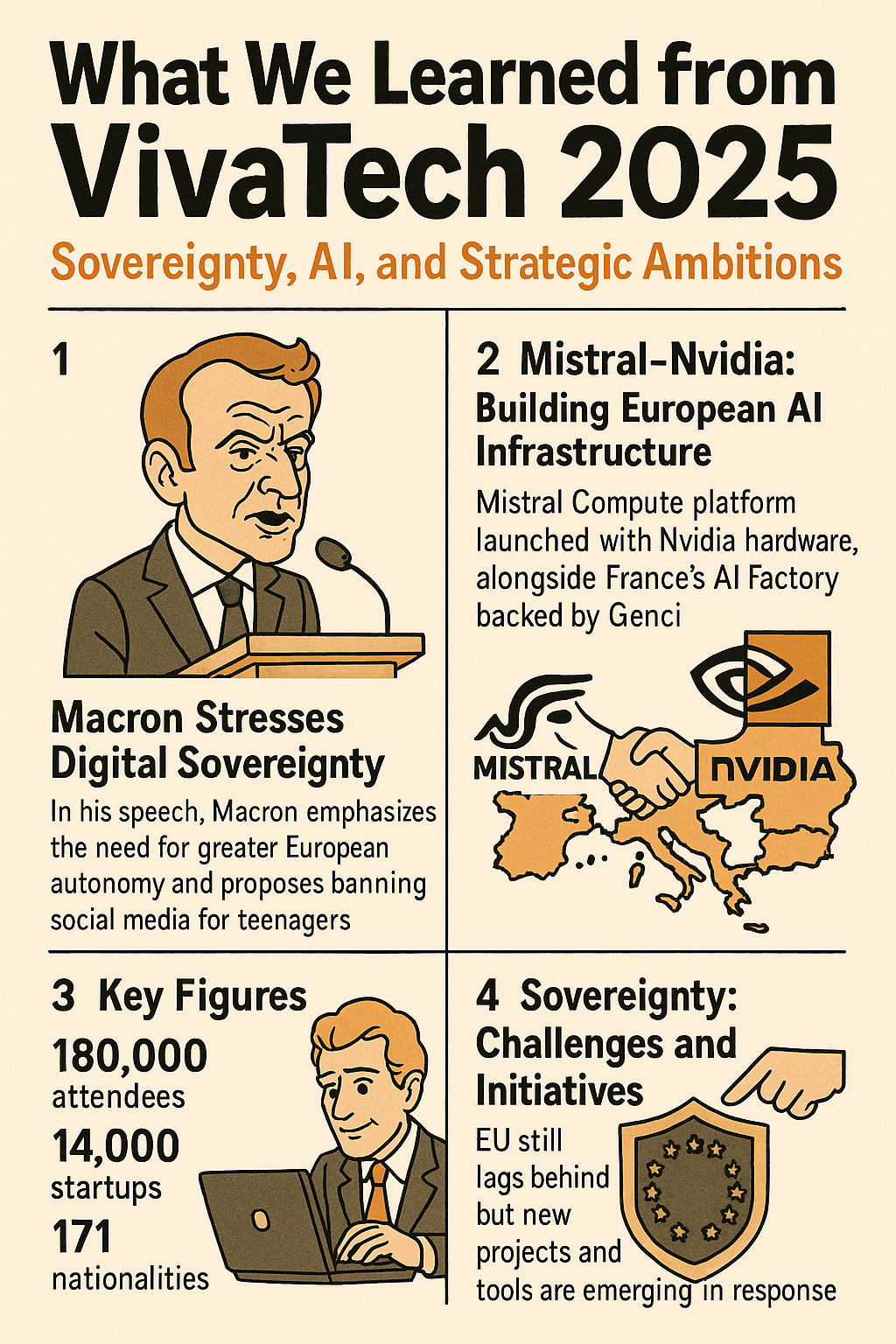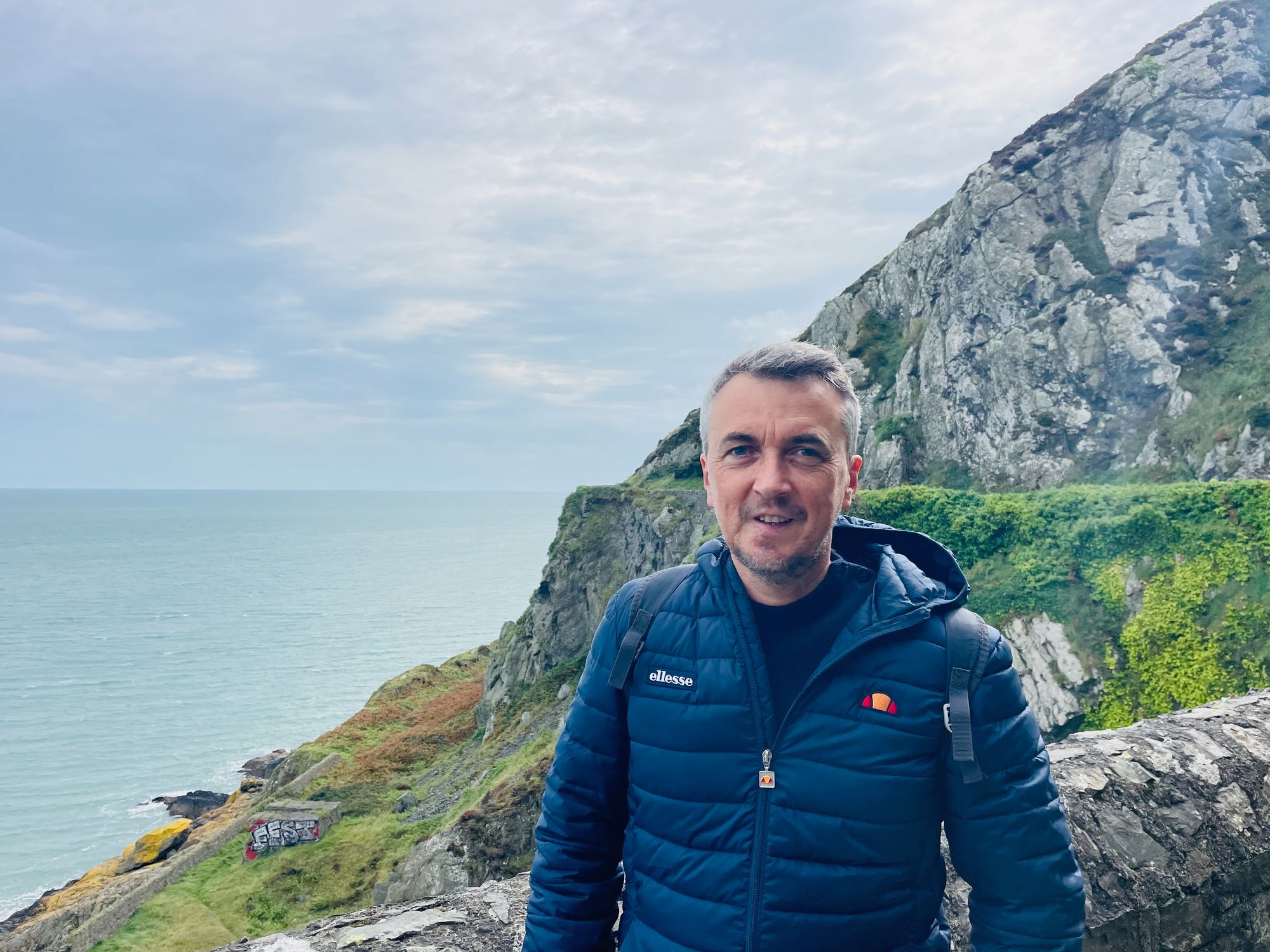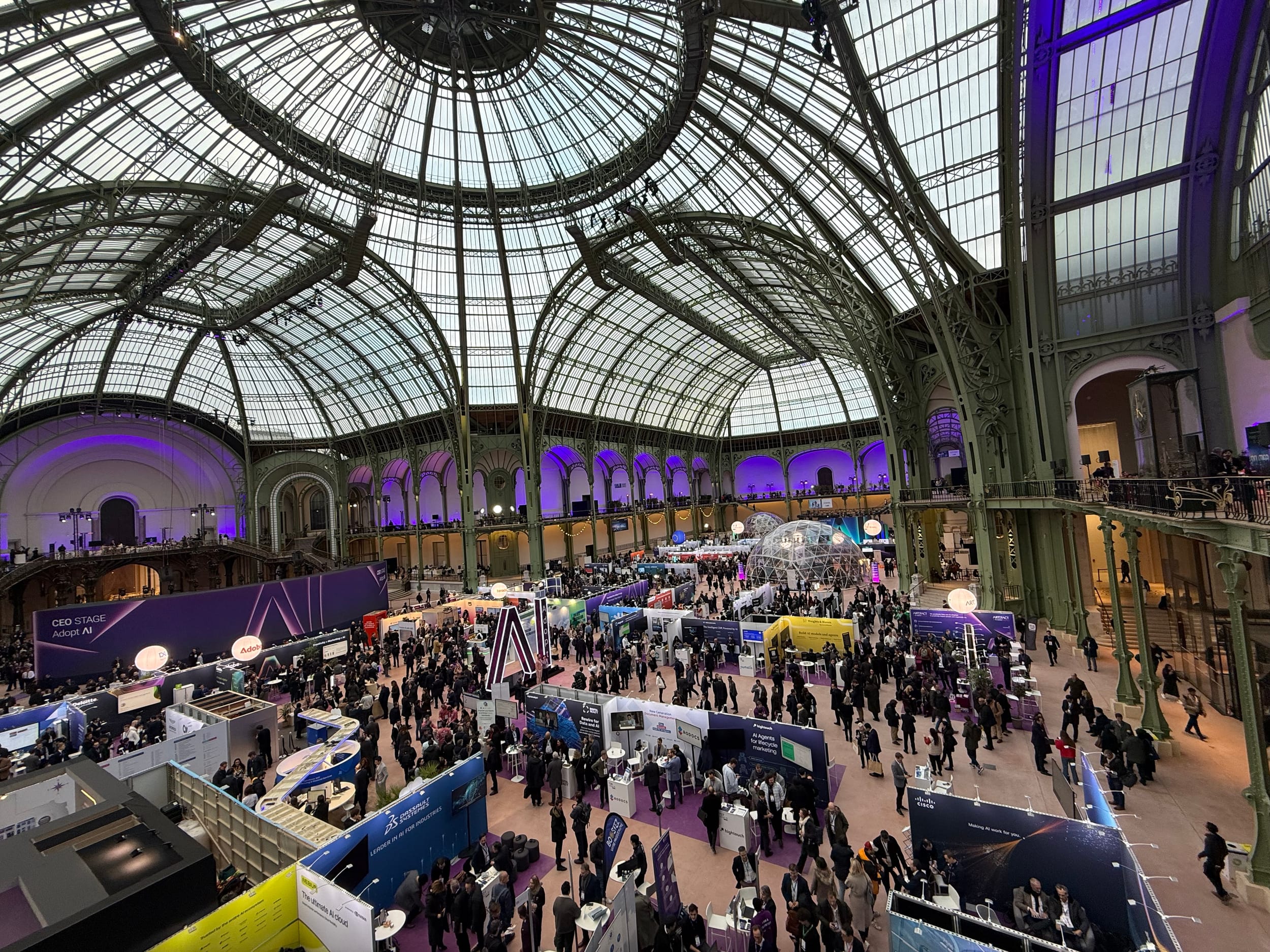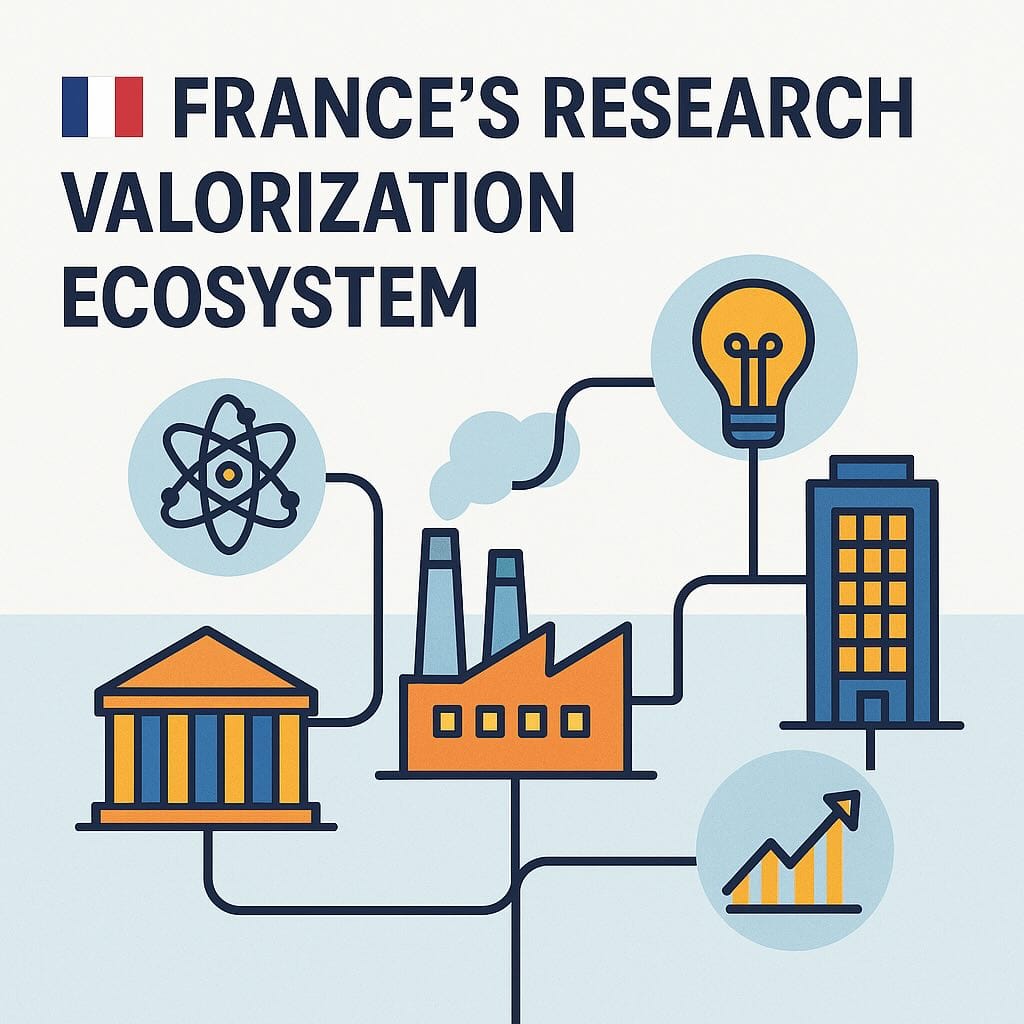What We Learned from VivaTech 2025: Sovereignty, AI, and Strategic Ambitions

Macron sets a bold tone, Mistral takes center stage, and Europe’s tech future unfolds.
VivaTech 2025 once again proved to be Europe’s flagship tech gathering, drawing over 180,000 visitors to Paris from June 11 to 14. With over 171 nationalities and participation from more than 120 countries, including many across Europe, the event consolidated its status as a unique space where startups, investors, corporations, and policymakers meet to shape the continent's technological future. While innovations in AI, robotics, mobility, and climate tech were omnipresent, the tone of the event was unmistakably political: digital sovereignty, strategic autonomy, and industrial resilience took center stage in conversations, panels, and announcements.
🌟 Macron’s Opening Speech: A Call for European Tech Sovereignty
President Emmanuel Macron delivered a striking keynote that underscored the importance of Europe regaining its technological footing. Speaking before an audience of entrepreneurs, public officials, and European commissioners, he declared:
Macron reminded attendees that Europe has, in recent years, ceded critical ground in digital autonomy. He stressed the need for European countries to innovate, invest, and regain industrial and technological control over their futures.
Macron emphasized the urgency of building sovereign digital infrastructure, reducing reliance on foreign technologies, and fostering a European ecosystem capable of competing with global giants. He also reiterated the French government's objective to train 100,000 AI professionals annually by 2030, to support the continent’s competitiveness. Notably, he addressed the societal impacts of digital platforms, proposing to ban social media access for those under 15, and calling on European regulators to take coordinated action. His speech was both a wake-up call and a rallying cry for European unity in tech policy.
⚖️ Mistral-Nvidia: Strategic Alliance in AI Cloud
One of the most talked-about announcements was the partnership between French AI startup Mistral and Nvidia, giving rise to "Mistral Compute" — a European cloud platform tailored for generative AI workloads. This alliance has been framed as a milestone for European tech autonomy, although its real-world impact remains to be demonstrated. If successfully deployed, it could empower public services, startups, and SMEs with cutting-edge infrastructure tailored to European standards.
Equipped with 18,000 Nvidia Blackwell chips, the platform will be deployed in France and integrated with European cybersecurity and data protection standards. While it relies on Nvidia’s US-made hardware, the control, operations, and user access models are designed to align with European sovereignty objectives. The European Commission and several national agencies welcomed the project as a step forward in building trusted European AI infrastructure.
This announcement complemented the efforts of the French AI Factory, coordinated by GENCI (Grand Équipement National de Calcul Intensif), which is working to provide compute resources, AI model access, and testing environments for a wide ecosystem of academic, industrial, and public actors. Together, these initiatives highlight France’s ambition to play a central role in structuring a federated, sovereign AI ecosystem across Europe. Several countries, including Germany, Italy, and Spain, expressed interest in future interoperability.
📊 Key Figures from VivaTech 2025
- ✨ 180,000 attendees
- 🏢 Over 14,000 startups represented
- 🌍 171 nationalities present
- 🤝 640,000 business connections recorded, including major European delegations
- 🏢 Over 14,000 startups represented, including many from across Germany, Spain, and Central Europe
- 🏛️ 3,600+ global investors in attendance, including Sequoia, Accel, Partech, and EIF
- 🔌 More than 300 tech product launches, many unveiled by European deep tech companies
- 🤖 40% of exhibitors focused on AI technologies, including several public research institutes and scale-ups from across the EU
VivaTech 2025 illustrated the growing cohesion of the European innovation ecosystem, with shared goals around digital sovereignty, ethical AI, and sustainable innovation. Institutional players such as the European Innovation Council (EIC), InvestEU, and several national export banks also took part, signaling their strategic alignment.
🛡️ Digital Sovereignty: Vision vs. Reality
Despite bold ambitions and inspiring declarations, the road to European digital sovereignty remains complex. As multiple sessions noted, over 80% of the continent’s AI and cloud infrastructure still comes from non-EU providers. European dependency on foreign technologies remains a structural challenge, particularly in the areas of semiconductors, data centers, and hyperscale cloud.
Yet, encouraging signs emerged at VivaTech:
- French public procurement increasingly favors SecNumCloud-certified solutions like Outscale and emerging platforms such as S3NS.
- The Gaia-X initiative showcased a new "Clearing House" compliance tool—Cloud Data Engine presented the first real-time software suite for Gaia-X-certified cloud services, offering a promising proof of concept for operational sovereignty in multi-cloud environments, though widespread adoption remains in its early stages.
The Cigref, a network of major French companies and public institutions, emphasized ahead of VivaTech the need to guide CIOs toward trusted cloud solutions. In its April 2025 report, it warned of Europe's heavy economic dependence on US-based hyperscalers and urged greater support for secure, interoperable European alternatives. Meanwhile, initiatives like Systematic Paris-Region, a French deeptech cluster, emphasized that strategic autonomy must be built through collaborative innovation and sustained investment in sovereign digital infrastructure. Their position focused on interoperability, resilience, and European governance rather than full technological independence. Panels and discussions at VivaTech also touched on the need to better align investment tools such as France 2030, the EU Chips Act, and IPCEI programs. While not always explicitly coordinated, these frameworks are increasingly viewed as complementary levers to accelerate Europe's shift toward digital and industrial sovereignty.
🌍 A Continental Effort
One of the most striking elements of VivaTech 2025 was the strength of European participation and coordination. Country pavilions from Germany, Central Europe, and Southern Europe were among those represented, reflecting a broad European presence. Participating countries included Cyprus, Estonia, Luxembourg, Ukraine, Spain, Italy, Germany, and Canada. The European Commission hosted a central booth presenting Horizon Europe calls, the AI Act, and support for green digital transformation.
A new "European Tech Sovereignty Forum" was also launched alongside VivaTech, under the high patronage of the French Ministry for Europe and Foreign Affairs. It brought together national ministers, secretaries of state, founders, and investors from over 15 EU countries for a high-level dialogue on aligning public procurement, fostering transnational cloud infrastructures, and shaping a shared vision for AI sovereignty. This strategic gathering served as a political and industrial prelude to the themes highlighted at the main VivaTech event, reinforcing the shared commitment to building a resilient and competitive European tech landscape.
Importantly, France's leadership on AI infrastructure, through projects like Mistral Compute and its alliance with public research, is increasingly seen as a springboard for broader European projects. Delegations from several member states expressed interest in contributing to future "AI Factories" or participating in the development of AI Factory Antennas, a new initiative launched by EuroHPC JU. These antennas aim to decentralize access to high-performance computing for AI across member states and are supported by dedicated EU funding under the Digital Europe and Horizon frameworks.
✈️ In Conclusion
VivaTech 2025 captured a moment of convergence: between vision and execution, national ambition and continental cooperation. It reflected Europe’s willingness to assert itself on the global tech stage while grappling with its dependencies. The challenge now is to transform this shared momentum into long-term capabilities—technological, industrial, and political.
Stay tuned for deeper dives into:
- The rollout of Mistral Compute and its governance model
- Policy implications of European social media regulations
- Gaia-X certification and its adoption by public administrations
#VivaTech2025 #Sovereignty #AI #DigitalEurope #MistralAI #Macron #CloudSovereignty #EuropeanTech


